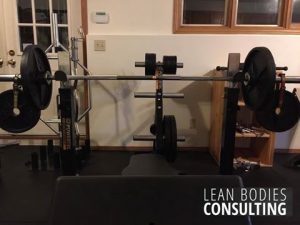“Chaos” Bench Press
You may have been in the gym and saw someone hanging a plate from the bar while benching (like in the pic below) and thought, ‘What the heck are they doing?’ This technique, which is referred to as the “chaos” bench press, creates an unstable load and is typically performed to help place a greater workload on the “core”. So does this technique work your chest, triceps or delts any harder? Well, a recent study published may have the answer. See below for more info:
In this study presented in the Journal of Strength and Conditioning Research, a research team compared the traditional bench press against the chaos bench press. To do so, they had 20 males with weight-training experience, bench in the traditional manner and with a weight hanging from the bar. (Note: In the study, they hung a kettle bell from the bar with a band. I unfortunately don’t have any kettle bells at home, so I had to make due with what I had. However, apparently hanging a plate from the bar is also common method for creating an unstable load.) Additionally, the subjects used two different loads while performing both exercises. That is, they used 60% and 80% of their one-rep max.
During each test, the subjects had electrodes attached to their pectoralis major (pecs), anterior deltoids (front delts), medial deltoids (side delts), latissimus dorsi (lats) and the triceps brachii (the three-headed monster on the back of your arm). ![]() :-)These electrodes help measure the muscle activity of each muscle.
:-)These electrodes help measure the muscle activity of each muscle.
What the researchers found was that there was no difference in muscle activity in any of the muscles tested for either load. That being said, you may be wondering why the researchers didn’t measure the muscle activity of the rectus abdominus (6-pack muscles) or the external obliques and I’m wondering the same thing. To my knowledge and, apparently, the researchers too, there’s no research to show that the chaos bench press actually places a greater workload on the core. That’s not say it doesn’t. It’s just that no research team has looked into this yet. Regardless, it is what it is.
Therefore, while it doesn’t appear that this training technique works the chest, lats, front/side delts or triceps any harder than performing the traditional bench press, the jury is still out on whether this works your core muscles to a greater extent.
For more information:
Dunnick DD, et al. Bench Press Upper-Body Muscle Activation Between Stable and Unstable Loads. J Strength Cond Res. 2015. Dec;29(12):3279-83.
